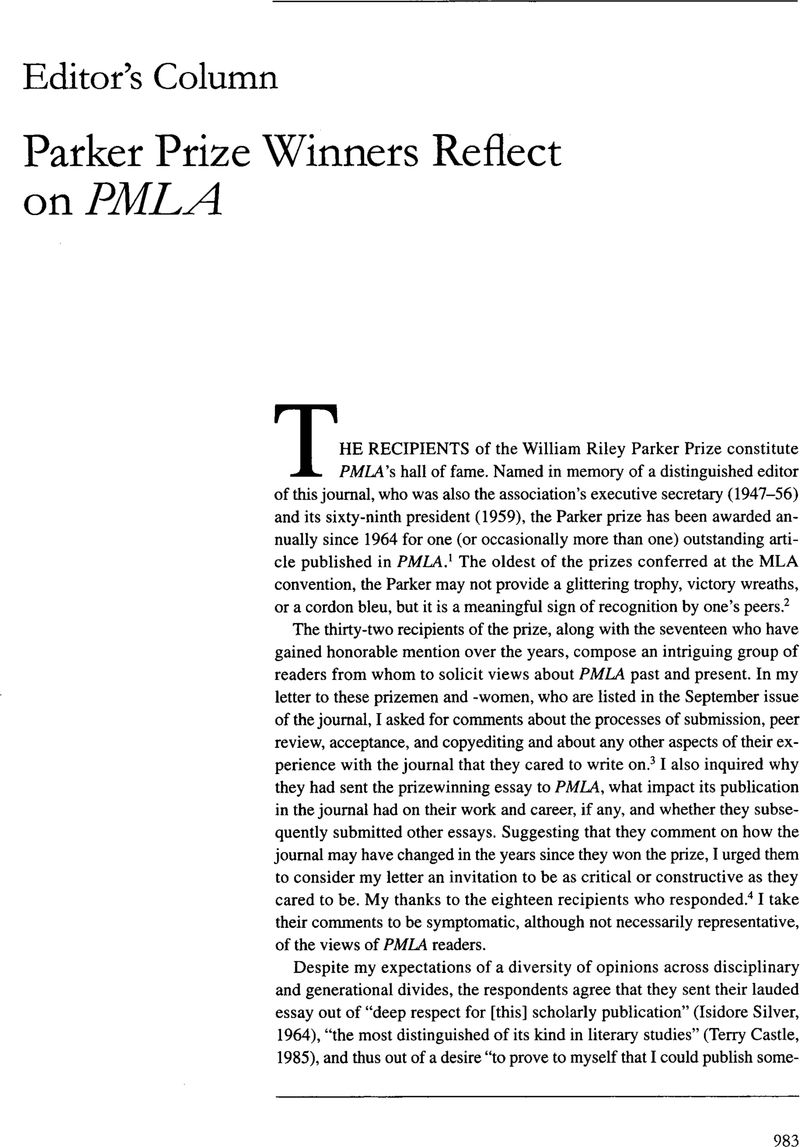Published online by Cambridge University Press: 23 October 2020

1 Founder of the MLA's Foreign Language Program and its director during 1952–56 and author of studies about foreign language education in the United States, William Riley Parker was a well-known scholar of British literature—Milton, in particular—and at the time of his death, in 1968, distinguished professor in and chair of the English department at Indiana University.
2 The five members of the William Riley Parker Prize Selection Committee are appointed by the Committee on Honors and Awards for three-year terms; the prizewinners each receive $500 and a certificate bearing a citation about the merits of the essay. Of course, merit does not exclude luck, as Paul Armstrong, who won the prize in 1983, observes: “In retrospect, it seems more and more like winning the lottery. Obviously, I think that my essay was very good, but so were many others that year, and so were many others that didn't get past the Editorial Board. Often a career … seems as much a matter of chance as of merit, and the combination of luck and hard work in winning the Parker prize reflects that.”
3 For the record, the first woman to garner the prize was Elisabeth Schneider. Except for George Wright (1974 and 1981), she is the only recipient to have won twice (1966 and 1973), although Marshall Brown has had two honorable mentions (1981 and 1984). Since 1964 there have been six female recipients of the Parker, four of them since 1985, and two female recipients of an honorable mention.
4 Paul Armstrong makes a valid point: “I'm not sure that receiving the Parker prize gives one special authority to comment on PMLA” I am sorry that an operation in May prevented Hans Eichner, the recipient of the prize in 1982, from contributing his views. The eighteen respondents represent winners from 1964 (Isidore Silver) to 1993 (Alan Nadel), but understandably their awards are concentrated in the last twenty years.
5 An awareness of the audience, writes Marshall Brown, makes a potential contributor send essays that “are broad in their coverage, likely to touch bases with more than one kind of reader.” The same idea informed the comments of members of the journal's Advisory Committee and Editorial Board on what makes an essay publishable in PMLA, which I discussed in my March 1995 column.
6 Conversely, the admission by William Andrews (1990) that “when I was notified that I had been selected to receive the … prize, I remember my first thought was, if my essay wins the Parker … what's happening to the quality of PMLA?” seems a variant of Groucho Marx's bon mot that he would never join a club that would admit him.
7 The civic analogy recurs in an observation by A. Kent Hieatt (1984): “the most telling criticism of PMLA's bureaucratized process is that it aspires to the condition of a national legal system.” He counters that “bureaucratically expensive and time-consuming procedures need to be built in to insure that justice is at least sometimes done.”
8 Even Edward Hirsch (1992), who felt his essay was under consideration “for what seemed like an inordinately long time,” allows that this unfortunate delay “was perhaps made up for by the excellent comments I received from the readers.”
9 In connection with the peer-review system, Caramagno raises a subject of current concern to me: “as literary studies become more and more interdisciplinary, journals will have to make special efforts to retain the services of experts in other fields who can constructively comment on attempts to bridge the gap between fields.” I hope that some of the letters on interdisciplinarity for the March 1996 Forum will tackle the problem of ensuring that multidisciplinary essays are assigned to readers who are sympathetic to such work and knowledgeable in relevant areas.
10 Hirsch would like to see articles that are “a little more essayistic, more formally conceived and beautifully written,” but finds the predominance of “merely adequate” writing “a problem in contemporary scholarship that goes well beyond PMLA.”
11 Waller's comments bear out my own experience in recent months, as I have urged PMLA authors to find visual materials that can enhance their essays. It is undeniable, however, that the expense of obtaining camera-ready pictures, which, under the journal's current policy, authors bear, can represent a financial burden for scholars who are untenured or whose institutions do not subsidize research costs.
12 Castle is one of the rare respondents who mention the journal's special topics and clusters.